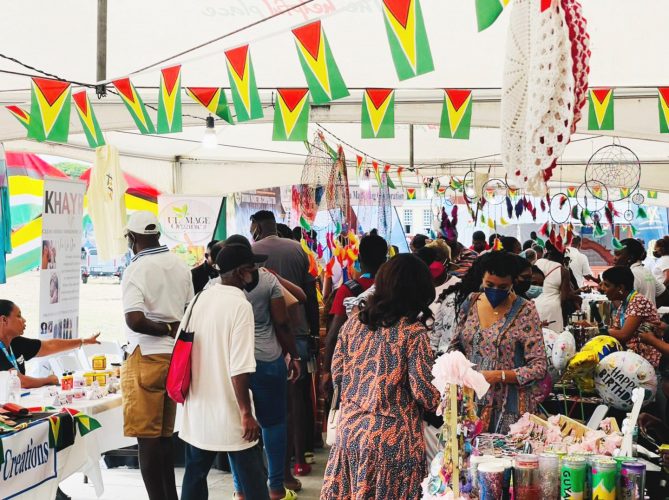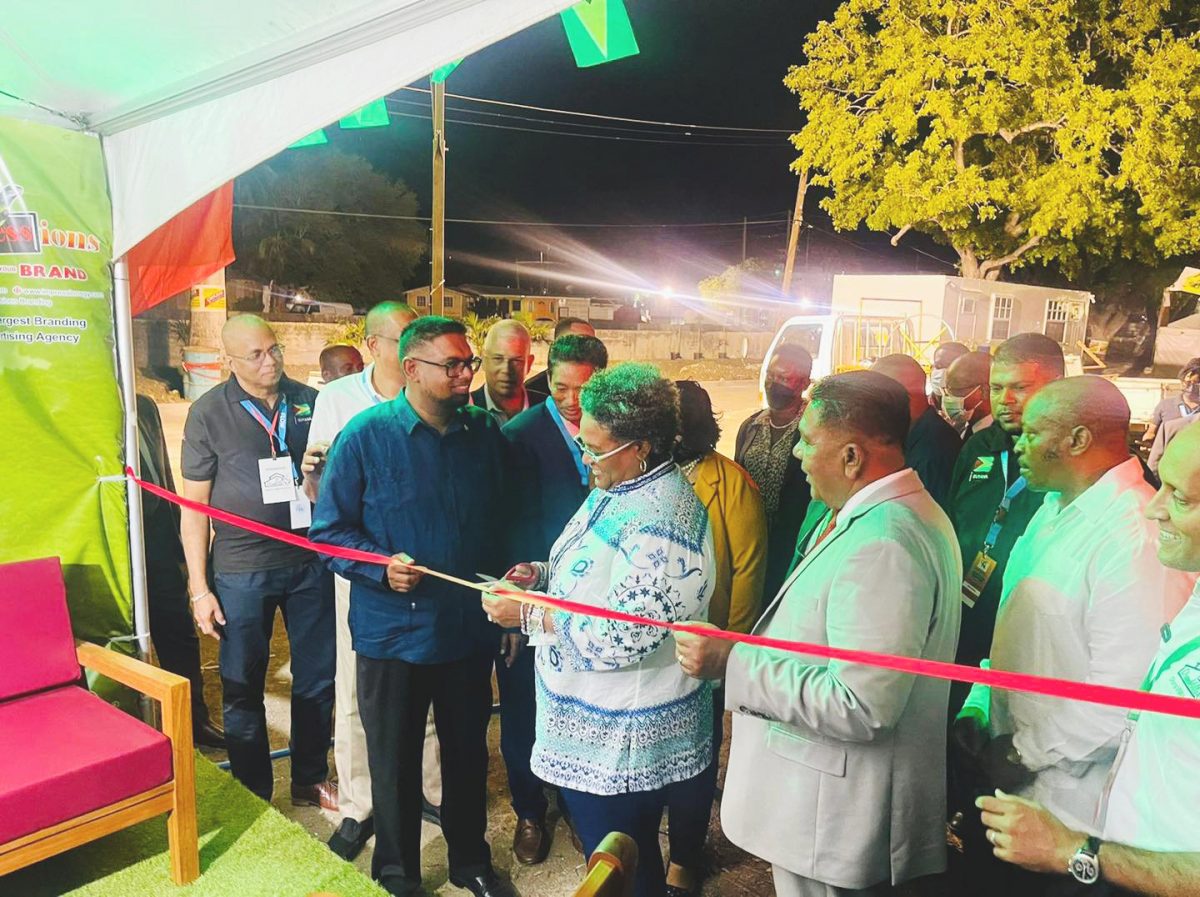President Irfaan Ali has said he and Barbados Prime Minister Mia Mottley are convinced that once they can show the results of their food security partnership, it can be replicated all across the region to create a win-win scenario.
Addressing Barbadians, Guyanese exhibitors, and other invitees, at the Barbados Agro Fest on Friday, Ali, while delivering the keynote address, emphasised the importance of agriculture as being at the centre of regional development, while acknowledging the initiatives Guyana and Barbados have embarked on to ensure their food security standing.

“The relationship that we are building between Guyana and Barbados is to bring economic prosperity to both countries. We are not looking at winning in one area or creating a situation where we are carving out an area for you and an area for Guyana. That is not what we want. We want a holistic approach to this relationship so that we create economic prosperity in every sector and in everything that we do together as one country, Guyana and Barbados,” he highlighted.
He noted that currently, young Barbadian farmers are participating in a mentorship programme in Guyana, learning lessons on food production using shade houses. These farmers, he said, will return and replicate the initiative to boost their country’s food production. He disclosed that a pre-fabricated shade house is currently being loaded unto vessel from Guyana and will be assembled for the group after they complete their farming programme in a month’s time.
Further, Guyana has set aside lands to facilitate agricultural activities for the benefit of both countries.
He explained that 50 acres will be allocated to, and owned by young people as part of the Black-Belly sheep project in Guyana. He added that 50 acres have also been allocated to persons with disabilities, single parents and women, and importantly, 50 acres of lands in Guyana will be allocated to young people in Barbados to advance food production.
“These farms will be working together in an integrated way to supply the market here. We are working on training your butchers here so that they can do the best cuts and Barbados can work on creating that logistics hub, moving these product on along the market chain. These are the type of initiatives that would bring long term and create long term sustainable relationships to what we are advancing and the path we’re taking,” Ali disclosed.
Food terminal site
On Saturday, President Ali and his delegation visited the location earmarked for the Guyana/Barbados Food Terminal at Lears, St. Michael.
The Food Terminal, according to a brief posted on the President’s Facebook page, will be constructed on seven acres of land. It will boast a multi-purpose facility to accommodate about 45 containers, cold storage, and packaging and processing plants.
There will also be a large reservoir for water storage and land set aside for crop production.
The terminal is being constructed with the objective to provide food at cheaper cost, marketing opportunities to farmers, and contribute to the export of food to other countries.
Most of all, the Guyana-Barbados Food Terminal, Ali said, is aimed at developing a trans-shipment hub to move food to different hotel chains and other Caribbean islands, and even to Miami, US.
“We must believe that we can do it. We must stop thinking narrowly that we cannot achieve this. We understand that there are challenges and hurdles. But where in life that success came that you did not have to overcome challenges and hurdles,” Ali contended as he hinted at the region becoming a major competitor in food production and supply.
“We are setting bold targets. We’re working on a bold and innovative idea. At the end of it, it’s only bold thinking, bold initiatives, and pursuing those initiatives [that] will ensure our success in this challenging world…”
He also noted that Guyana is assisting Barbados in setting up a meeting with farmers from Brazil to partner with in food production and tourism opportunities.
The Guyanese leader posited that these initiatives will not see or bear fruit unless there is a hands-on approach and trust between the parties. He stated that this is why at the level of the government, they are working to demonstrate and create a trusting environment and an enabling environment for partnerships to work.
“This is an important factor in advancing the relationship and it’s because of the new dynamism in this relationship, in this trust, that I’m talking about that today” there is participation of more than 150 delegates from Guyana and 55 exhibitors at the exposition.
Collective effort needed
Meanwhile, declaring that the Caribbean region would not be considered a top priority market during food shortages, Ali in his address urged the region to work as a collective to prevent devastating impacts on its people and accelerate its food security plan.
“When there is a shortage of supply, we are not the top priority for the demand that exists. Now that is why we have to fix this and we have to fix it as a collective. We have to understand that the challenges that will come will impact us the most. Our only tool to mitigate those challenges is increasing our own production,” Ali posited as he stressed the need for regional states to remove impediments to trading between themselves, while opening up opportunities through which they can sustain themselves in a reliable manner.
He noted that every Caribbean nation brings a “unique opportunity” to the table to assist in creating a solution to address food security and production to aid the region’s development.
Ali further stated that the countries must not only increase food production but also look to change consumption patterns to safeguard its people from depending on that which is produced outside of the region.
To this end, the Guyanese leader challenged importers and distributors to change their business models and expand their businesses to be a part of the production sector. He also told distributors that they are a key stakeholder to breaking the consumption patterns. Distributors must look at the possibilities of moving products that are made in the region, Ali suggested, before assuring that governments are ready to assist and partner with the private sector to achieve food security.
“You have an excellent opportunity now because governments in the region… are ready and willing to embrace you on this journey and support you on this journey of transforming our food infrastructure or our food value chain.” Ali underscored.
Nonetheless, he cautioned that while regional leaders are working to develop the transportation and logistics infrastructure within the region, the focus must be placed on securing markets to create sustainability in the imminent future.
It was noted that leaders are already working on a master plan for the region to enhance the regional food production system and support systems to farmers to encourage production.
The global supply chain woes and the negative impacts on food supply due to the armed conflict between Russian and Ukraine, coupled with the pandemic, have forced regional leaders to find solutions to the looming food security catastrophe in the region.
With the Caribbean food importation bill pegged at US$6 billion, leaders have committed to an aggressive plan to reduce importation by 25% by 2025.
Guyana and Barbados along with Trinidad and Tobago and other CARICOM countries, in recent months have signed onto agreements to accelerate plans to achieve that goal.
“We cannot see ourselves as competitors, we cannot see ourselves as opposite sides of the wicket [but as] a singular collective, a singular partner working together in one common goal and vision that is to give the best possible opportunity to the people of our country to bring prosperity put food on the tables of our people in this region at a less cost, at a sustainable cost, in an easier fashion,” Ali declared, as he highlighted the importance of partnerships for the achieving food security.
President Ali is accompanied by several government representatives, including the Minister of Agriculture, Zulfikar Mustapha, and the Minister of Tourism, Industry and Commerce Oneidge Walrond.





